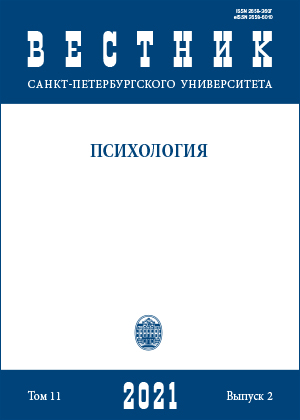Analysis of caregiver-child interaction when transferring children from a baby home to post-institutional families
DOI:
https://doi.org/10.21638/spbu16.2021.203Abstract
The article presents a study of characteristics of the interaction of children with the experience of institutionalization and caregivers both at the departure from a baby home and at different stages of living in post-institutional families, as well as their comparison with characteristics of interaction of parents and children in biological families. Previous studies have shown that the quality of interaction with a caregiver is one of the factors that mitigate the effects of early deprivation. To assess the quality of interaction, the PCERA method was used, based on the analysis of video recordings of a child and his caregiver during free play. A total of 31 cases of interaction between caregivers and children with the experience of institutionalization (IE; average age 29.3 ± 22.9 months) and 51 cases of interaction in biological families (BF; 38.8 ± 17.5 months) were analyzed. It was found that during the transition from a baby home to a post-institutional family, the quality of caregiver-child interaction remains at a relatively low level. In the first 24 months of a child’s residence in a family, foster parents have a lower level of sensitivity, mirroring and involvement in interaction with a child, more unpredictable behavior and negative emotions than parents in BF. After 24 months in a post-institutional family, children show a decrease in emotional stability and compliance and an increase in negative affect, in comparison with the assessment at the departure from an institution and in relation to their peers from a BF. At the same time, the overall total and some child’s indicators improve with increasing age of children in both the IE and BF groups. The results obtained underline the need to create psychological follow-up programs for post-institutional families aimed at supporting the development of interaction and the formation of attachment at the earliest stages after the child is transitioned to a post-institutional family.
Keywords:
children, experience of institutionalization, caregiver-child interaction, baby home, post-institutional family
Downloads
References
Downloads
Published
How to Cite
Issue
Section
License
Articles of "Vestnik of Saint Petersburg University. Psychology" are open access distributed under the terms of the License Agreement with Saint Petersburg State University, which permits to the authors unrestricted distribution and self-archiving free of charge.




